专升本考点---英语倒装
英语专升本语法基础知识大全
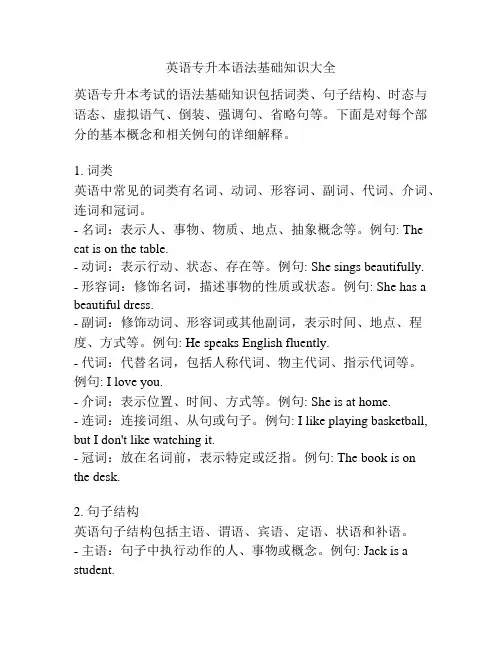
英语专升本语法基础知识大全英语专升本考试的语法基础知识包括词类、句子结构、时态与语态、虚拟语气、倒装、强调句、省略句等。
下面是对每个部分的基本概念和相关例句的详细解释。
1. 词类英语中常见的词类有名词、动词、形容词、副词、代词、介词、连词和冠词。
- 名词:表示人、事物、物质、地点、抽象概念等。
例句: The cat is on the table.- 动词:表示行动、状态、存在等。
例句: She sings beautifully. - 形容词:修饰名词,描述事物的性质或状态。
例句: She has a beautiful dress.- 副词:修饰动词、形容词或其他副词,表示时间、地点、程度、方式等。
例句: He speaks English fluently.- 代词:代替名词,包括人称代词、物主代词、指示代词等。
例句: I love you.- 介词:表示位置、时间、方式等。
例句: She is at home.- 连词:连接词组、从句或句子。
例句: I like playing basketball, but I don't like watching it.- 冠词:放在名词前,表示特定或泛指。
例句: The book is on the desk.2. 句子结构英语句子结构包括主语、谓语、宾语、定语、状语和补语。
- 主语:句子中执行动作的人、事物或概念。
例句: Jack is a student.- 谓语:句子中说明主语动作或状态的部分。
例句: The cat is sleeping.- 宾语:接受动作的对象。
例句: She bought a book.- 定语:修饰名词或代词的词组或从句。
例句: I like the blue car.- 状语:修饰动词、形容词或副词的词组或从句。
例句: He waited patiently.- 补语:用来补充说明主语或宾语的信息。
例句: She is a teacher.3. 时态与语态- 时态:表示动作或状态发生的时间。
专升本英语语法重点汇总
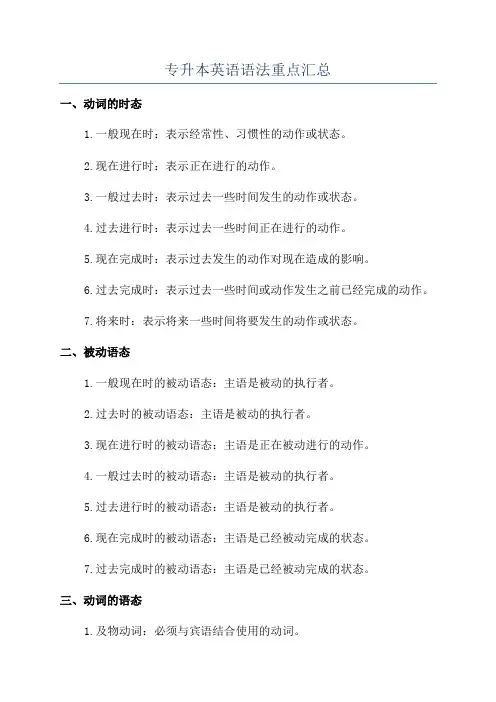
专升本英语语法重点汇总一、动词的时态1.一般现在时:表示经常性、习惯性的动作或状态。
2.现在进行时:表示正在进行的动作。
3.一般过去时:表示过去一些时间发生的动作或状态。
4.过去进行时:表示过去一些时间正在进行的动作。
5.现在完成时:表示过去发生的动作对现在造成的影响。
6.过去完成时:表示过去一些时间或动作发生之前已经完成的动作。
7.将来时:表示将来一些时间将要发生的动作或状态。
二、被动语态1.一般现在时的被动语态:主语是被动的执行者。
2.过去时的被动语态:主语是被动的执行者。
3.现在进行时的被动语态:主语是正在被动进行的动作。
4.一般过去时的被动语态:主语是被动的执行者。
5.过去进行时的被动语态:主语是被动的执行者。
6.现在完成时的被动语态:主语是已经被动完成的状态。
7.过去完成时的被动语态:主语是已经被动完成的状态。
三、动词的语态1.及物动词:必须与宾语结合使用的动词。
2.不及物动词:不需要与宾语结合使用的动词。
四、倒装句1.完全倒装:把助动词或情态动词放在主语前。
2.部分倒装:把助动词或情态动词放在谓语动词前。
五、情态动词1. can:表示能力、许可、可能。
2. could:表示过去的能力、许可、可能。
3. may:表示允许、可能。
4. might:表示过去可能。
5. must:表示推测、必须。
6. shall:表示将来的意愿。
7. should:表示建议、应该。
8. will:表示将来。
9. would:表示过去习惯、愿意。
六、名词1.可数名词:可以用来计数的名词。
2.不可数名词:不可以用来计数的名词。
3.特殊名词变复数形式。
4.特殊名词变单数形式。
七、形容词和副词1.形容词在句中的位置。
2.形容词比较级和最高级。
3.副词在句中的位置。
4.副词比较级和最高级。
五、代词1.主格代词:作为主语的代词。
2.宾格代词:作为宾语的代词。
3.物主代词:表示所属关系的代词。
4.反身代词:表示动作反过来作用于自己的代词。
天一文化专升本常考英语强调句及倒装句
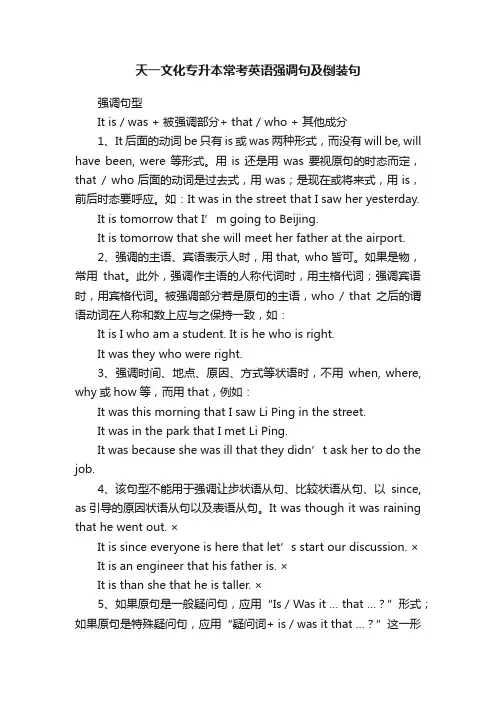
天一文化专升本常考英语强调句及倒装句强调句型It is / was + 被强调部分+ that / who + 其他成分1、It后面的动词be只有is或was两种形式,而没有will be, will have been, were等形式。
用is还是用was 要视原句的时态而定,that / who后面的动词是过去式,用was;是现在或将来式,用is,前后时态要呼应。
如:It was in the street that I saw her yesterday.It is tomorrow that I’m going to Beijing.It is tomorrow that she will meet her father at the airport.2、强调的主语、宾语表示人时,用that, who皆可。
如果是物,常用that。
此外,强调作主语的人称代词时,用主格代词;强调宾语时,用宾格代词。
被强调部分若是原句的主语,who / that之后的谓语动词在人称和数上应与之保持一致,如:It is I who am a student. It is he who is right.It was they who were right.3、强调时间、地点、原因、方式等状语时,不用when, where, why或how等,而用that,例如:It was this morning that I saw Li Ping in the street.It was in the park that I met Li Ping.It was because she was ill that they didn’t ask her to do the job.4、该句型不能用于强调让步状语从句、比较状语从句、以since, as引导的原因状语从句以及表语从句。
It was though it was raining that he went out. ×It is since everyone is here that let’s start our discussion. ×It is an engineer that his fath er is. ×It is than she that he is taller. ×5、如果原句是一般疑问句,应用“Is / Was it … that …?”形式;如果原句是特殊疑问句,应用“疑问词+ is / was it that …?”这一形式,例如:Was it at eight o’clock that you began to work?What is it that makes this kind of fish different from other fish?How was it that you missed such a fine lecture?6、如果原句含有not…until(短语或从句),变成强调结构时,应把not 和until 一并置于be之后,例如:It was not until I told her that she knew anything about it.It was not until his father came in that the boy began to prepare his lessons.It was not until she took off her dark glasses that I realized she was a famous film star.7、该句型不能强调谓语。
专升本英语语法倒装
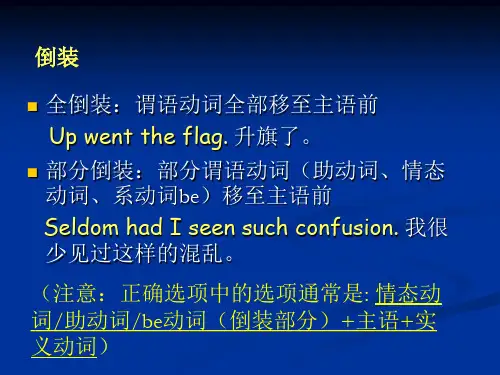
1。含有否定意义的词或短语放在句首的倒装
never, little, barely, seldom, rarely, hardly, scarcely, nowhere, no, few, nor, neither, by no means, in no case, in no way, at no time, under/in no circumstances, on no account, not until, no sooner …than, hardly …when, scarcely …when, barely …when, not
2。as或though引导的让步状语从句引起的倒 装(注意:不是although)
3。so或such等表示程度的副词位于句首引起 的倒装
4。only+副词、介词短语或状语从句位于句 首引起的倒装
5。虚拟语气中条件句的倒装
6。So(neither, nor)+be (助动词、情态动词) +主语
7。There, here, then, now等表示地点、时间 的副词或介词短语以及 out, in, away, up, bang等表示方位或拟声词位于句首的倒装
only…but also, in vain等
例外
但是,如果句首的否定词否定的是主语则 不引起倒装:Little help can be expected from Peter. Hardly anyone loved the Italians except the French.
如果句首状语的否定意义与后面的另一否定词或 其他词语所抵消,则不引起主谓Байду номын сангаас分的倒装: Not infrequently they go abroad. 他们不是不常去国外。
专升本英语倒装句真题聚焦1
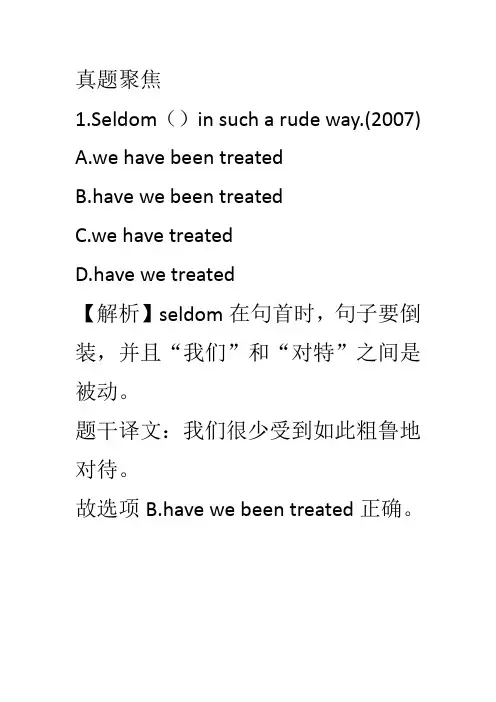
真题聚焦1.Seldom()in such a rude way.(2007)A.we have been treatedB.have we been treatedC.we have treatedD.have we treated【解析】seldom在句首时,句子要倒装,并且“我们”和“对特”之间是被动。
题干译文:我们很少受到如此粗鲁地对待。
故选项B.have we been treated正确。
2.()water resources have been severely wasted or polluted.(2009)A.They are scarceB.Scarce they areC.Scarce as they areD.As scarce they are【解析】本题考点是as表示“让步”,要用倒装。
故选项C.Scarce as they are 正确。
题干译文:尽管它们很稀少,但水资源依然被严重地浪费和污染。
3.So loudly()that all the people in the room got a fright.(2012)A.he shoutedB.shout heC.did he shoutD.he did shout[解析】考查倒装。
so位于句首,句子用部分倒装。
部分倒装是把助动词或情态动词提前,选项C符合条件。
题干译文:他喊的声音如此的大,以至于房间里的每个人都吓了一跳。
故选项C.did he shout正确。
4.-“I don't drink coffee at all.”一“().”(2012)A.So don't IB.I do eitherC.Nor I doD.Neither do I【解析】本题考查倒装句。
首先排除B选项;so和don‘t不能搭配,排除A:两者的否定用neither,排除C。
只有选项D 正确。
题干译文:—我根本不喜欢喝咖啡。
浙江专升本英语语法:倒装讲义
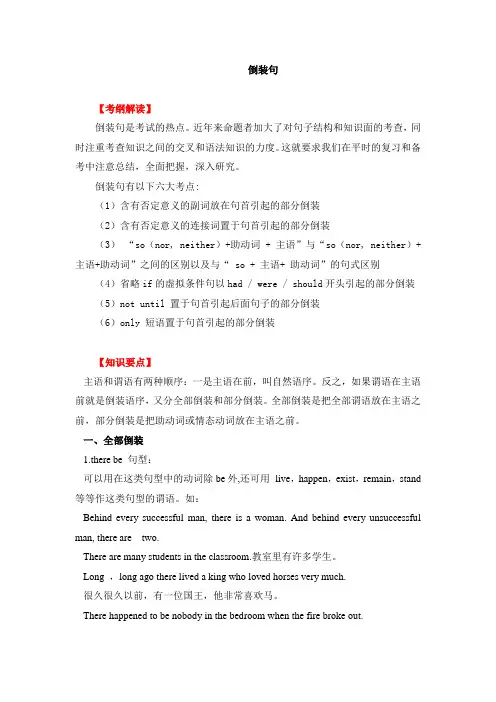
倒装句【考纲解读】倒装句是考试的热点。
近年来命题者加大了对句子结构和知识面的考查,同时注重考查知识之间的交叉和语法知识的力度。
这就要求我们在平时的复习和备考中注意总结,全面把握,深入研究。
倒装句有以下六大考点:(1)含有否定意义的副词放在句首引起的部分倒装(2)含有否定意义的连接词置于句首引起的部分倒装(3)“so(nor, neither)+助动词 + 主语”与“so(nor, neither)+主语+助动词”之间的区别以及与“ so + 主语+ 助动词”的句式区别(4)省略if的虚拟条件句以had / were / should开头引起的部分倒装(5)not until 置于句首引起后面句子的部分倒装(6)only 短语置于句首引起的部分倒装【知识要点】主语和谓语有两种顺序:一是主语在前,叫自然语序。
反之,如果谓语在主语前就是倒装语序,又分全部倒装和部分倒装。
全部倒装是把全部谓语放在主语之前,部分倒装是把助动词或情态动词放在主语之前。
一、全部倒装1.there be 句型:可以用在这类句型中的动词除be外,还可用live,happen,exist,remain,stand 等等作这类句型的谓语。
如:Behind every successful man, there is a woman. And behind every unsuccessful man, there are two.There are many students in the classroom.教室里有许多学生。
Long ,long ago there lived a king who loved horses very much.很久很久以前,有一位国王,他非常喜欢马。
There happened to be nobody in the bedroom when the fire broke out.起火的时候,碰巧房间里面没有人。
英语倒装句型 【专升本必考题型】
倒装的实质:语序(谓语+主语)倒装的作用:强调倒装的分类:全部倒装和半倒装(必考点)谓语:1. be+表语2.情态动词+动词原形3.实义动词什么情况下用半倒装呢?1. 表示否定意味的副词位于句首,采取全倒装。
Eg:(1).She hardly stays up too late on weekend.半倒:Hardly does she stay up too late on weekends.(2). She at no time goes to the bar.半倒:At no time does she go to the bar.2.主倒从不倒(1). Hardly/ scarcely...when=no sooner... than将hardly/scarcely/no sooner 位于句首,主句半倒装,从句不变。
Eg: I had hardly entered the room when I heard the ring.半倒:Hardly had I entered the the room when I heard the ring.总结:Hardly/Scarcely/No sooner +had +主语+done+....when/than....(2).only +副词/介词短语/时间状语从句,主句(be/情态动词/助动词+主语+表语/动词原形)Eg:Only in this way can we protect the environment.Eg: Only when she comes back do I know the news.3.前倒后不倒(1)So/such...that... “如此。
以至于。
”Eg: she is so beautiful that I can not breathe. 半倒:So beautiful is she that I can not breathe.总结:So/such +adj./adv.+be/情态动词/助动词+主语+其他+that 从句(不倒装)真题:So_________ that she has no time to rest.A.Busy she wasB.Busy was sheC.Was she busyD.She was busy(2)Not only...but also...“不仅...而且。
外语考试-英语倒装句常见结构及用法
英语倒装句常见结构及用法完全倒装结构及用法一、具有“地点”意义的副词、时间意义的副词,以及能表移动方向的副词放在句首,句子的主语是名词,谓语是连系动词或表示“位置移动”的单个不及物动词时,该动词放在主语前面。
如:There goes the bell.注意:当主语是人称代词时,尽管副词在句首,主谓不倒装。
如:Out they rushed.二、具有“方位”意义的介词短语或副词短语在句中作状语或表语放在句首,谓语是连系动词be,以及表示“位于、存在”或“位置移动”的单个不及物动词时,该动词放在主语前面。
如:Among the hens is a big cock.三、作表语的形容词或分词放在句首时,连系动词放在主语前面[英语语法]。
如:Present at the party were the ladies in the big city.四、全部倒装是只将句子中的谓语动词全部置于主语之前。
全部倒装常见结构有:1) here, there, now, then, thus等副词置于句首, 谓语动词常用be, come, go, lie, run。
There goes the bell.Then came the chairman.Here is your letter.2) 表示运动方向的副词或地点状语置于句首,谓语表示运动的动词。
Out rushed a missile from under the bomber.Ahead sat an old woman.注意:上述全部倒装的句型结构的主语必须是名词,如果主语是人称代词则不能完全倒装。
Here he comes. Away they went.部分倒装结构及用法把谓语的助动词、情态动词放在主语前面为部分倒装。
在下列情形中出现部分倒装。
一、把“so ... that ...”句型中的“so + 形容词/ 副词”部分放在句首时,be动词或助动词放在主语前面。
专升本英语语法---倒装
(1)疑问句要倒装。
疑问句分为一般疑问句、特殊疑问句、选择疑问句和反意疑问句, 多数疑问句都是倒装语序。
如Is this raincoat yours? When shall we meet again? He was very unhappy, wasn’t he?【注意】反意疑问句中前面陈述部分不倒装,后面附加部分要倒装;特殊疑问句中当主语是疑问词或是被疑问词所修饰时, 也不倒装。
如:Who is Jerry Cooper? Which team won the game?(2)Only所修饰的副词、介词短语或状语从句放在句首时。
要用半倒装.结构: Only+副词( 介词短语或状语从句)+ 助动词\情态动词\be+主语.eg:Only then did I realize that I was wrong. 直到那时我才意识到自己错了。
Only in this way can you learn your lessons well. 按照这种方法你才能把你的学习学好。
Only when the war was over did he know his son had given his life to the country. 战争结束时,他才知道自己的儿子为国捐躯了。
Only when the war was over in 1949 was he able to go to school.Only in a big city was it possible for him to buy a wheelchair.Only after I read the text over again did I know its main idea.(3)含有否定意义的副词或连词,如not\barely\scarcely\never before\ hardly\not until\ never\not only\ little,\seldom\no sooner ...than(刚......就)\under no circumstances(决不)\by no means \in no time \in no case\nowhere\not only ...but also(前面部分倒装)\at no time等,放在句首时,部分倒装。
专升本学位英语讲义-强调句、倒装句
第二章-强调句、倒装句第二章常考语法——7.强调句、倒装句强调句强调句是一种修辞手段,通过各种方式对句子中的某个部分进行强调。
只有一般现在时和一般过去时,如:It was not until the teacher came in that students stopped talking.They did give me some help.This is the only book that I am interested in.It引导的部分强调句It的两种基本用法it作形式主语,代替主语从句、动词不定式或动名词短语,被代替的是句子的真正的主语。
It delighted me that I could go to the college that I liked.(作形式主语代替主语从句)It作形式宾语I think it very important to learn English well.(代替动词不定式)It引导的部分强调句it is /was+被强调部分+that/ who+原句其他成分可以用来强调主语、宾语、状语。
如果强调的主语或宾语是指的人,则that可以由who来代替。
如果强调的是状语,则不能用when, where来代替,只能是由that来引导。
如:It is us who/that are taught by Miss Wang.(强调宾语)It is in the class 9 that Miss Wang teaches us.(强调状语)特殊强调:It is/ was not until+被强调部分+that+其他部分It was not until his wife came back that he went to bed.It引导的部分强调句判断是否是强调结构的方法是,去掉it is/was和that后,剩余部分(经调整后)是否依然是个完整的句子,如果是,就是强调结构,否则就不是。
- 1、下载文档前请自行甄别文档内容的完整性,平台不提供额外的编辑、内容补充、找答案等附加服务。
- 2、"仅部分预览"的文档,不可在线预览部分如存在完整性等问题,可反馈申请退款(可完整预览的文档不适用该条件!)。
- 3、如文档侵犯您的权益,请联系客服反馈,我们会尽快为您处理(人工客服工作时间:9:00-18:30)。
幻灯片 1倒装结构inversion专升本真题解析1. Jane hadn't been to London before. had her husband. (安徽专升本11年01题)A. NeitherB. EitherC. SoD. Or解析:考查倒装句,表示某人也没有干什么事,用neither,且后面倒装。
故选择A。
2. No sooner had he arrived in Rome he heard of the good news. (安徽专升本11年02题)A. whenB. thanC. thenD.until解析,此题涉及到倒装句和时间状语从句,no sooner…than为固定搭配,no sooner提前需用倒装句,该题选择B。
3. Only when you have collected sufficient data ,_____come to a sound conclusion.( 安徽专升本10年12题)A. you canB. can youC. you shouldD. should you解析:only+时间状语开头,用倒装句,故排除A和C,should表应该和本题意不符,故选择B。
4. Few words after the meeting.(安徽专升本10年27题)A. did they exchangeB. they exchangedC. they did exchangeD. exchanged they解析:否定词few开头,用倒装句型,故选择A。
5. It was because he wanted to draw money from the bank _____he went downtown yesterday.(10年09题)A. whenB. howC. whyD. that解析:考查强调句型。
只能填that,故选D。
6. Scarcely had he fallen ________ when a knock at the door awakened him.(安徽专升本09年15题)A.sleeping B.asleep C.sleepy D.sleeper解析:此题涉及倒装句。
Scarcely…when句型,否定词提前需用倒装句,将had 提前,同时fall asleep为固定搭配,故选择B。
7. Much_________she likes him, she would never consider marrying him.(安徽专升本08年10题)A. whileB. asC. althoughD. despite解析:考查让步状语从句中的倒装结构,上面只有as有倒装用法,故选择B。
幻灯片 4英语句子的自然语序是“主语 + 谓语”。
如果将谓语的全部或一部分放在主语之前,这种语序被称为“倒装”。
谓语全部放在主语之前,为全部倒装;只把助动词,连系动词或情态动词放在主语之前,为部分倒装。
倒装的原因:一是语法结构的需要(如某些疑问句);二是为了强调;三是保持句子的平衡或是上下文紧密相接。
幻灯片 5一、全部倒装(谓语全部放在主语之前)此结构通常只用与一般现在时和一般过去时幻灯片 61.there be句型, 其中be动词有时可exist, live, stand, lie, seem, appear,remain, happen 等词代替(全部倒装)1) There is an experienced teacher and many lovely students in the classroom.2) There lay a winding brook in front of an old house.2.方位词in, out, there, here, inside, outside, up, down,away, off, downstairs, upstairs等以及now, then放在句首时,谓语动词常用be, come, go, lie, run等,并且句子的主语是名词。
(全部倒装)1) Away flew the bird which I bought yesterday.2) Now comes your turn to sweep the floor.注意:主语是人称代词时,仍用自然语序。
Away they went. (=They went away.)幻灯片 73.直接引语的一部分或全部放在句首时,有时用倒装。
(全部倒装)“What’s up, Tom?” asked Mother.“The car is mine,” said Tom.注意:主语是代词时,不倒装。
“The car is mine,” he said.4.为了平衡句子结构的需要,或为了强调状语(常为介词短语),或为了使上下文紧密衔接时,将状语提前(全部倒装)They arrived at a farmhouse, in front of which sat a small boy.5.主语太长,表语太短,为了平衡句子结构的需要,将表语提前。
(全部倒装)1. Inside the pyramid are the burial roomsfor the kings and queens.2. Gone are the days when we are enslaved.3. Present at the meeting are ten famous writers.4. Among the children was an old man.such和be连用作表语时,也常用倒装语序,如:1. Such was not his intention.2. Such are the facts.二、部分倒装把助动词,连系动词或情态动词放在主语之前幻灯片 101.用于疑问句。
(部分倒装)Shall everything be ready before you arrive?What can I do for you?注意:疑问词做主语或修饰主语时,主谓不颠倒.Who can work it out?How many students have read this book?2.用于省略if的虚拟条件从句中,should / were / had 被放在句首。
(部分倒装)1)Had I not adopted my class teacher’s advice, I would have made sucha serious mistake.2)Were she you, she would tell her parents the truth.3) Should I earn money, I should live better幻灯片 11_____ it rain tomorrow, we would have to put off visiting Beijing.A. WereB. ShouldC. WouldD. Will________hard at college, you would have got a better job.A. If you workedB. Did you workC. Had you workedD. You had worked3、so, as, neither, nor, no more 位于句首,表示前面的情况也适合于另一人或物时。
(部分倒装)Tom can speak French. So can Jack.If you won't go, neither will I.-- Do you know Jim quarrelled with his brother?-- I don't know, _____.A. nor don't I careB. nor do I careC. I don't care neitherD. I don't care also 注意:若只是表示对前面所述内容的肯定,确认,主谓不倒装Tom asked me to go to play football and so I did.“It's raining hard.”“So it is.”My brother had a bad cold last week, and so _____.A. did IB. had IC. was ID. I did10. “Do you know Jim quarreled with his brother?”“I didn’t know,_____.”A. nor don’t I careB. nor do I careC. I don’t care neitherD. I don’t care also4. 含有否定意义的副词或连词置于句首,如hardly, rarely, seldom, scarcely, barely, never, not, few, little, neither, nor, not only, hardly…when, in no case,by no means, no sooner…than, many a time, often 等。
(部分倒装)1)Not until the 19th century was the written examination probably known.2)Not only was everything he had taken away from,but also his German citizenship.3)Not a single mistake did he made.4)Hardly had I reached the bus stop whenthe bus started.还有一些表示否定意义的介词短语位于句首时,句子也要求用倒装结构,常见的这类介词短语都还有“no”, 如,at no time, in no case, by no means, in no way, under/ in no circumstance 等。
in no way/case =on no occasion=by no means=on no account=in / under no circumstances(决不)如,a) Under no circumstances shall I change myattitude towards beauty.无论如何我都不会改变自己对美的态度。
